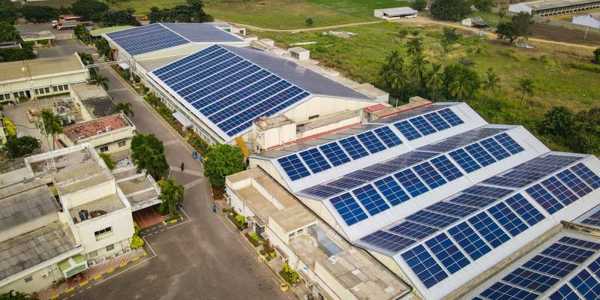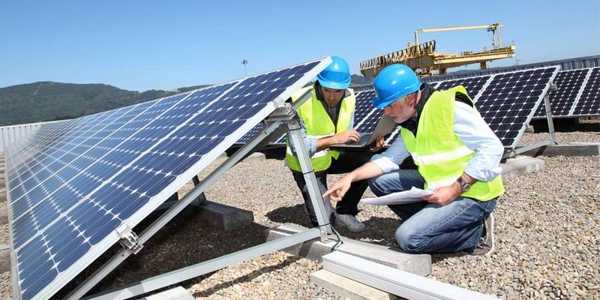In today's climate-conscious world, renewable energy has emerged as a critical component of business strategy. Stakeholders are increasingly recognising the importance of sustainable practices, not only for environmental protection but also for enhancing corporate image and profitability. Among renewable options, solar energy is gaining remarkable traction within commercial enterprises.
Understanding Commercial Solar Energy

Commercial solar energy systems are specifically designed to harness sunlight for power generation in a business context, differing significantly from residential solar setups, which cater to individual homes. While residential systems typically focus on meeting day-to-day household energy consumption, commercial systems are engineered to accommodate larger energy demands. They involve extensive arrays of solar panels and robust energy storage solutions.
The benefits of transitioning to solar in a commercial context are compelling. One primary advantage is the substantial cost savings on energy bills; businesses can see a reduction of up to 70% in their electricity costs, allowing those savings to be reinvested back into the company. Furthermore, adopting solar energy contributes to a reduced carbon footprint, an essential consideration for many consumers today. For example, by installing a solar system, a mid-sized office can reduce its annual carbon emissions by approximately 100 tons. Moreover, numerous government incentives, such as tax credits and grants, are available for businesses investing in solar energy, further enhancing the financial benefits and affirming it as a sustainable choice for the future.
Key Factors to Consider When Choosing a Commercial Solar Company
When selecting a commercial solar provider, businesses should meticulously evaluate several crucial factors to ensure they choose a reliable and effective partner in their transition to renewable energy.
Experience and Track Record: A provider's past experiences significantly impact their credibility. Look for companies with a proven track record of successful installations and satisfied clients. Reviews, case studies, and industry certifications can offer valuable insights into a provider's reliability and quality of service.
Technology Used: The landscape of solar technology is continually evolving. It's vital to discuss the types of solar panels and systems available and ensure they utilise the latest, most efficient technologies. High-efficiency solar panels can dramatically enhance energy output and long-term savings for businesses.
Customer Service and Support: Ongoing support is integral to the successful implementation of solar solutions. Consider providers that offer robust customer service, solid maintenance plans, and excellent troubleshooting assistance. A company that is readily available for support can help mitigate potential issues, thereby ensuring the longevity and optimal performance of your solar investment.
Financing Options: Understanding the various financing choices available—such as leasing versus outright purchasing—is essential. Companies should seek providers that offer flexible financial solutions tailored to their specific needs, thereby maximising return on investment while minimising upfront costs. By carefully weighing these factors, businesses can make informed decisions that lay the groundwork for a successful solar adoption journey.
Top Commercial Solar Companies
As the demand for renewable energy solutions intensifies, several commercial solar companies have emerged as leaders in the industry, offering innovative systems and exceptional service. Here are three standout companies raising the bar in commercial solar.
1. SunPower Corporation, Founded in 1985, is committed to sustainable energy solutions, focusing on delivering high-performance solar technology. Their mission is to create the world's most efficient solar panels, enabling businesses to transition to renewable energy effortlessly. SunPower provides a comprehensive range of services, including solar panel installation, maintenance, and performance monitoring.
They are renowned for their notable projects, such as the installation at the General Motors factory in California, which showcases their capability to manage large-scale operations. With impressive metrics, SunPower boasts a 90% customer satisfaction rating and an average installation timeline of just 30 days, positioning it as a trusted leader in the industry.
2. First Solar First Solar was established in 1999 and specializes in manufacturing solar panels and providing utility-scale PV solar solutions while promoting sustainable energy practices. Their mission is to provide clean, affordable solar energy through innovative technology. The company's offerings encompass manufacturing solar modules, system development, and long-term maintenance.
A notable project is the Mount Signal Solar facility in California, which ranks among the largest solar plants globally. First Solar distinguishes itself with a remarkable 99% reliability rate for its solar panels and an expedited installation period, averaging 28 days, making them a preferred option for large companies seeking efficiency and reliability.

3. Canadian Solar, Established in 2001, is recognised as one of the largest solar manufacturers globally, promoting renewable energy through high-quality products. Their mission focuses on providing accessible solar solutions for diverse applications. Canadian Solar provides comprehensive services encompassing solar project development, system integration, and post-installation support.
Their notable installations include the solar roof projects at Walmart, emphasizing their capability to scale effectively with customer needs. With competitive advantages such as a 95% customer satisfaction rating and an installation rate of as low as 25 days, Canadian Solar remains a key player in the solar market, appealing to businesses eager to invest in renewable energy.
Real-world Success Stories
In the journey toward sustainability, several businesses stand out for leveraging solar energy to transform their operations. Notably, Walmart has installed over 700 solar projects across its stores, which has significantly reduced energy costs. With an ambitious goal to power 50% of its operations using renewable energy by 2025, Walmart's commitment bolsters its bottom line while enhancing its brand image, as eco-conscious customers increasingly favor sustainable practices.
IKEA is another notable example, having committed to becoming climate-positive by 2030. The company has invested heavily in solar power, featuring over 900,000 solar panels on their rooftops worldwide. This initiative has reportedly saved IKEA millions in energy costs while also providing customers with space to learn about sustainable living, thereby enhancing customer satisfaction and loyalty.
Lastly, Google has embedded sustainability into its core operations, achieving 100% renewable energy usage since 2017. Solar installations across their data centres have significantly reduced carbon emissions, resulting in a substantial environmental impact. Google's transparency in sharing its sustainability efforts resonates with eco-conscious consumers, leading to a stronger connection with its user base. Each of these companies exemplifies how solar energy solutions can not only propel businesses forward but also engage customers on personal and environmental levels.
Future of Commercial Solar Energy
Growing optimism surrounds the commercial solar energy sector, with technological advancements poised to revolutionize business operations. Innovations such as bifacial solar panels and enhanced energy storage solutions promise higher efficiency and reduced costs, making solar energy more accessible. Additionally, the rise of smart solar systems that integrate with IoT devices further optimises energy use. As sustainability solidifies its role as a business imperative, the future of commercial solar underscores its crucial contribution to corporate profitability and environmental stewardship.
















